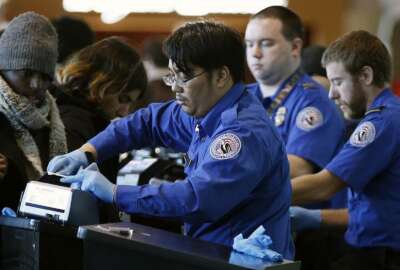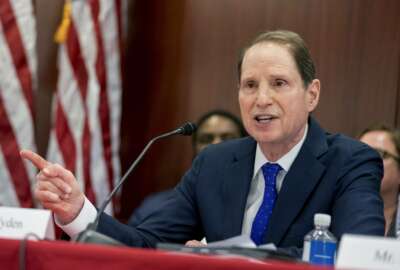

There's bipartisan consensus transportation security officers are underpaid, but Congress can't yet agree on the best path for raising TSA salaries.
With some salaries starting at $29,000 a year, many members of Congress agree Transportation Security Administration officers are underpaid.
But even after a years-long debate, they can’t yet agree on the best path to raise their salaries.
For Democrats, the solution comes in the form of legislation, the Rights for the Transportation Security Administration Workforce Act. The bill, which House Democrats have introduced twice before, would give transportation security officers (TSOs) the chance to earn a salary under the 72-year-old General Schedule.
It would also move TSOs into the Title 5 personnel system, giving them full collective bargaining rights and the chance to appeal disciplinary actions to the Merit Systems Protection Board, which has been largely non-functional for the last four years.
The House passed a similar bill twice before, but the Senate has never considered it.
Democrats said their bill would address chronic morale issues at TSA by improving their chances at higher pay, while giving them the same rights and protections that other federal employees have. They called TSA’s current personnel system “second class.”
And with much of the TSA workforce coming from underrepresented backgrounds — 55% of the 60,000 agency employees are people of color — some in Congress believe it’s past time to equalize pay, benefits and protections for TSOs with the personnel system many other federal employees have.
“TSA is driving diversity and inclusion in our country’s homeland security workforce,” Joi Chaney, senior vice president for policy and advocacy and the executive director of the National Urban League’s Washington bureau, said Tuesday at a hearing before the House Homeland Security Subcommittee on Transportation and Maritime Security. “And yet, transportation security workers are not afforded the protections and the benefits of their counterparts elsewhere in the Department of Homeland Security or the federal government at large. It makes you wonder.”
But for some Republicans, moving TSOs under Title 5 and the General Schedule isn’t the solution.
“I also believe wholeheartedly they are underpaid,” Rep. Carlos Gimenez (R-Fla.), the subcommittee’s ranking member, said. “We as Congress should be appropriating more money for TSO workers so we can bump them up in pay and bring them up to the level that most federal employees are getting, because I do think that that’s part of the problem.”
When Congress first created TSA nearly 20 years ago, it specifically excluded TSOs from the General Schedule pay scale and Title 5 personnel system, which many — but not all — other federal employees are classified under today.
Congress instead gave TSA leadership broad authority to hire, appoint, discipline and set pay and promotions for TSOs. But the agency under multiple administrations hasn’t used those authorities — until recently.
“The flexibility has existed to make life better and fairer and more predictable, but it hasn’t happened,” said Bonnie Watson Coleman (D-N.J.), the subcommittee chairman. “The one thing Title 5 does is ensures predictability and treatment equal to what other federal employees get.”
At the recommendations of a blue-ribbon panel commissioned by the agency, TSA in 2019 began exploring ways to better use its existing flexibilities. The panel at the time recommended the agency give TSOs a series of targeted pay increases.
Darby LaJoye, the senior official performing the duties of the TSA administrator, told Congress on Wednesday that the agency has acted on some of those recommendations.
Some 32,000 TSA workers received a 1%-2% pay raise last week, and 4,500 TSOs with more service time are eligible to receive a 5% raise, LaJoye told the House Appropriations Homeland Security Subcommittee.
He said DHS and TSA are currently reviewing the bill from House Democrats, which has more than 150 cosponsors.
“For us, there are a couple of keys irrespective of whatever the personnel system that TSA operates under,” LaJoye said. “It needs to ensure at least what TSA employees would make compared to their colleagues in Title 5. We think it needs to strengthen and promote due process rights for our workforce. It needs to strengthen and encourage collective bargaining. It needs to allow us to perform our agile security missions.”
Supporters of the Rights for the TSA Workforce Act said the bill would accomplish those goals and improve employee morale.
TSA, which makes up nearly one-third of the entire DHS workforce, typically has the lowest employee engagement scores of any subcomponent at the department.
“Pay is their number one issue,” Everett Kelley, national president of the American Federation of Government Employees, said of the TSO workforce. “I’m listening to them every single day. So many of them can barely make ends meet because of that.”
Kelley acknowledged the General Schedule isn’t perfect. But he described it as a “proven system,” and he said TSOs want and have asked for the General Schedule.
But Jeff Neal, former chairman of the TSA blue-ribbon panel, said his team found no evidence that moving TSOs to the General Schedule would resolve their frustrations and improve workforce morale.
“When we looked at employee survey data at TSA, what we found is that there were some airports where the workforce had good things to say about TSA and about the work,” he said. “And there were airports where people were doing the same work and were incredibly unhappy. Obviously pay is a factor in that, but the quality of supervisors is a bigger factor.”
Neal pointed to Customs and Border Protection, where morale is also among the lowest at DHS. Many CBP employees are paid at a GS-12 level, he said, and the General Schedule hasn’t resolved morale issues there either.
He instead urged the subcommittee to set minimum pay standards and codify promotion standards for TSOs — and think beyond the General Schedule.
“That system is inflexible,” said Neal, who served as the DHS chief human capital officer during the early days of the Obama administration. “It doesn’t provide the ability for people to move up quickly. It doesn’t provide the ability to adapt the pay to the labor market, and it was designed when literally more than half of the federal employees were GS-5 and below clerks. It was a system designed for a workforce of clerks, which we don’t have now.”
Good government groups and agency chief human capital officers themselves have advocated for improvements to the General Schedule for years, but Congress has never acted, nor has it expressed sincere interest in changing the classification system in recent years.
“Let’s be realistic, these problems, as your witnesses have told you, have been known for some time,” said Tom Warrick, a former a former DHS senior executive and a senior fellow and director of the Future of DHS project for the Atlantic Council. “Yet this problem has not been fixed. One of the reasons that I welcome [the bill] is that it is a forcing function; it will compel changes that will address these problems.”
Neal agreed pay issues are significant at TSA, but he said the General Schedule doesn’t guarantee better pay for TSOs.
The bill from House Democrats, at least as it’s currently written, doesn’t specify what grade level Congress believes it should classify TSOs.
“Some of TSA’s classifiers said they would be GS-5s,” Neal said. “Some of them told us they would be GS-7s or maybe GS-8s.”
According to General Schedule pay scales, a GS-5 in Atlanta, Georgia, for example, would earn between $37,154 and $48,302 in 2021.
Annual salaries for a GS-7 or 8 in the same locality pay area range from $46,023 to $66,262, according to the Office of Personnel Management.
“It’s certainly true that the Title 5 approach has its flaws, but the solution is to fix the flaws in Title 5, not to say that TSA employees should somehow be denied the benefits of Title 5 simply because it has flaws,” Warrick said.
Watson Coleman said the bill is still in the development stage, and the committee could tweak the language to ensure TSOs are classified at a specific grade on the General Schedule.
“By and large there’s bipartisan support for what we’re intending to accomplish on behalf of these frontline employees, who really had it on the line during the pandemic,” she said. “I’m going to ask that my Republican counterparts on this subcommittee consider signing onto the legislation. You want to help us make it better, please offer your advice. We agree these employees are entitled to greater protections and greater dignity and respect for the work that they do.”
Copyright © 2024 Federal News Network. All rights reserved. This website is not intended for users located within the European Economic Area.
Nicole Ogrysko is a reporter for Federal News Network focusing on the federal workforce and federal pay and benefits.
Follow @nogryskoWFED


